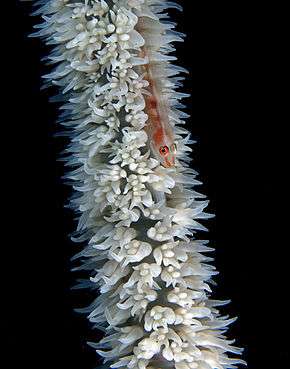Bryaninops yongei
| Whip coral goby | |
|---|---|
 | |
| Not evaluated (IUCN 3.1) | |
| Scientific classification | |
| Kingdom: | Animalia |
| Phylum: | Chordata |
| Class: | Actinopterygii |
| Order: | Perciformes |
| Family: | Gobiidae |
| Genus: | Bryaninops |
| Species: | B. yongei |
| Binomial name | |
| Bryaninops yongei (W. P. Davis & Cohen, 1969) | |
| Synonyms | |
| |
Bryaninops yongei, the wire-coral goby or whip coral goby, is a benthic species of goby widely distributed from the tropical and subtropical waters of the Indian Ocean (including the Red Sea) to the islands in the center of the Pacific Ocean.
Description
The whip coral goby has a semi-transparent head and body, with white scales running along its vertebra. Its head is reddish-brown to violet in color and the goby has pink to violet-red eyes.[1] Their coloration is noted to match the color of the coral they inhabit.[2] The fish is approximately 3 to 3.5 centimeters long.[3][4] Healthy whip coral gobies have seven dorsal spines, seven dorsal soft rays, one anal spine and seven anal soft rays. They also have cup-like pelvic fins and gills that open below the base of the pectoral fins.[5]
Taxonomy and naming
The white coral goby is a member of the genus Bryaninops, the family Gobiidae and the order Perciformes.[6] It was discovered in 1906.[7]
Habitat
There are noted populations of the whip coral goby around areas such as the Marshall Islands, Chagos Archipelago and Samoa. The whip coral goby lives in and around coral species such as stinging coral.[8] Whip coral gobies usually live in pairs in association with the wire coral species Cirrhipathes anguina (Antipathidae) at depths of between 3 to 45 metres (9.8 to 147.6 ft). These pairs are usually male-female pairs.[9] This species is also found in the aquarium trade.[4]
Behavior
Reproduction
Whip coral gobies reproduce through benthic spawning, meaning they release eggs and sperm to be fertilized externally.[10] They also have the ability to change their sex when there is a gender imbalance.[11]
Relation with coral
Gobies such as the whip coral goby respond to chemical signals released from the coral reefs they inhabit. The gobies will eliminate algae toxic to coral from their environment and will also clean mucus build-ups off of coral.[12]
Defensive behaviour
The white coral goby lacks the ability to cause harm to predators. As such, the whip coral goby is not a threat to human safety.[13] However, white coral gobies have the ability to quickly propel themselves through water to escape from predators. This defensive mechanism makes it difficult for researchers to study the fish in its natural habitat.[2]
References
- ↑ Randall, John (1997). Fishes of the Great Barrier Reef and Coral Sea. Hawaii: University of Hawaii Press.
- 1 2 "Tiny and Inconspicuous". UEMIS. Retrieved 25 May 2014.
- ↑ Jackson, Jack (2008). Dive Atlas of the World. New Holland Publishers. p. 99.
- 1 2 Froese, Rainer and Pauly, Daniel, eds. (2013). "Bryaninops yongei" in FishBase. April 2013 version.
- ↑ "Bryaninops Yongei". Fish Base. Retrieved 25 May 2014.
- ↑ "Bryaninops yongei". Animal Diversity Web. Retrieved 25 May 2014.
- ↑ Randall, John (1997). Fishes of the Great Barrier Reef and Coral Sea. Hawaii: University of Hawaii Press.
- ↑ Randall, John (1997). Fishes of the Great Barrier Reef and Coral Sea. Hawaii: University of Hawaii Press.
- ↑ "Whip Goby, Bryaninops yongei". Australian Museum. Retrieved 25 May 2014.
- ↑ "Reproduction of Bryaninops yongei". Fish Base. Retrieved 25 May 2014.
- ↑ "Why Don't More Animals Change Their Sex". Yale University. Retrieved 25 May 2014.
- ↑ "Coral Reef 911: Corals Attacked by Seaweed Use Chemical Signals to Summon Help". National Science Foundation. Retrieved 25 May 2014.
- ↑ "Bryaninops Yongei". Fish Base. Retrieved 25 May 2014.